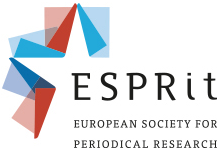Call for Papers: Reading Miscellanies/Miscellaneous Reading: Interrelations between Medial Formats, Novel Structures, and Reading Practices in the Nineteenth Century (29–31 August 2019, University of Cologne)
International Conference of the DFG-Research Unit "Journal Literature" (FOR 2288), 29−31 August 2019, University of Cologne
The conference “Reading Miscellanies/Miscellaneous Reading” is dedicated to reading practices of miscellaneous media formats and novel structures as well as to their theoretical reflection during the ‘long’ nineteenth century. Our initial observation is that the success of miscellaneous media formats such as journals (i.e., the spectrum of periodical print publications from newspapers to pocketbooks, gift books, or annuals) and anthologies has significantly changed historical reading practices. In reconstructing these changes, the conference is interested in the transformation of "expected expectations" (Siegfried J. Schmidt) that also affect novel structures within as well as outside these media formats and thus contribute to the development of the modern novel.
We invite proposals on the following sections. The focus of the conference will be on German media formats and novels, but due to the diverse transfer processes at both the media and the literary level, a comparative, international extension is very desirable.
More info after the jump—
- Reading Miscellanies: Reading miscellaneous media formats and novel structures
The first section is dedicated to analyses of the various reading practices applied to miscellaneous media formats and novel structures. In this context, it is first necessary to differentiate between different formats of miscellanies: miscellaneity is understood as a fundamental condition of media formats that guarantees a broad readership response by mixing various short or fragmented text types, images, and diverse topics. But it also refers to miscellanies as a generic format of journals, to a rubric within journals, and to anthological book formats. These different formats and aspects of miscellaneity will be analyzed through exemplary readings: Which methods – from close to distant reading – are applied? Which theoretical concepts are introduced to explain miscellaneity? And how is miscellaneity reflected in the structure of the modern novel, e.g. Karl Gutzkow’s "novel of juxtaposition" or Theodor Fontane’s "novel of multitude": are there intertextual references to miscellaneous articles, and if so, are they integrated into the novel through techniques of collage or montage or transformed into the novel’s plot? Are they interwoven in the form of episodes, conversations, narrative digressions, figure portraits or constellations? Or does miscellaneity rather result in a mixture of different journalistic and literary text types, genres, and writing styles?
- Miscellaneous reading: Historical reading practices and their (medial) self-reflection
Already at the end of the eighteenth century, "mixed reading" is mentioned in pedagogical theory as the "cause of the current calamity" (Johann Bernhard Basedow). This critical perspective aims at random readings of books, but can be extended to new miscellaneous media formats: the contents of periodical media are also mixed in a arbitrary way, which leads to new reading techniques such as browsing or zapping (Harun Maye). At the same time,
miscellaneity opens up new modes of follow-up readings (e.g. by reviews or advertisements of further journals, anthologies, and novels). Since the "conceptual reader" (Ursula Rautenberg/Ute Schneider, following Roger Chartier) may follow these offers or decline them, reading becomes ‘scattered’ in a twofold sense. This leads to a revaluation of the reader (Barbara Benedict), which also represents the danger of miscellaneous reading from a pedagogical perspective. In this section, traces of such historical reading practices, e.g. in the form of metareflexive commentaries of editors, narrators, or readers, textual or pictorial depictions of reading scenes, reviews or epitextual testimonies in the form of diaries and correspondence, will be analyzed in a comparative manner. In addition, institutions, places, and media of miscellaneous reading will be identified and discussed.
- Reading Reading: Aporias of scientific reading practices and theories
Both the academic reading of miscellaneous media formats and novel structures and the reconstruction of historical reading practices are connected with the recurring methodological aporias that the third section will address: do homogenizing hermeneutic reading practices necessarily miss the contingency and contiguity, which is constitutive for miscellaneity through their procedures of contextualization and semantization? How can historical reading possibilities of "conceptual readers" be reconstructed in the light of this problem? How were contemporary reading practices legitimized theoretically? Or should we rather look for alternative miscellaneous reading practices that do justice to both contingency and contiguity as well as to the interrelation between interrupted readings and the various possibilities of continuing and connecting them? And how can such practices be reconstructed and adequately conceptualized when historical sources are scarce and mostly based on implicit knowledge? Finally, how can the epistemic preconditions of reading practices, which also include our own scholarly readings today, be addressed and reflected?
Submissions
Lectures designed for a length of 30 minutes are invited to the conference. Conference languages are generally English and German, but lectures in French are also welcome. Travel and accommodation costs will be covered by the organizing research group.
To apply, we ask for corresponding abstracts (maximum 500 words) and a short curriculum vitae (maximum 150 words), which should be sent to This email address is being protected from spambots. You need JavaScript enabled to view it.">This email address is being protected from spambots. You need JavaScript enabled to view it. by 15.01.2018.
The conference is organized by subproject 1 "Miscellaneous Poetics. On the Coevolution of the Periodical Press and the Modern Novel" (Daniela Gretz, Marcus Krause and Nicolas Pethes).
Please contact This email address is being protected from spambots. You need JavaScript enabled to view it. if you have any questions.
Website of the research unit: www.rub.de/journalliteratur
